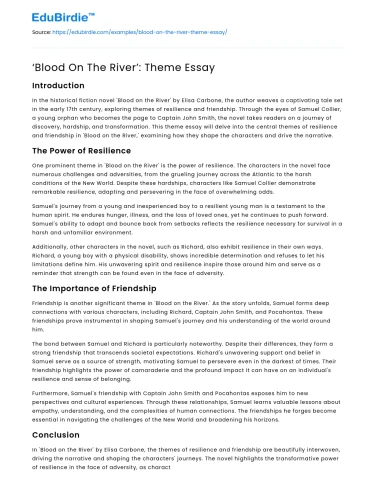Introduction
In the historical fiction novel 'Blood on the River' by Elisa Carbone, the author weaves a captivating tale set in the early 17th century, exploring themes of resilience and friendship. Through the eyes of Samuel Collier, a young orphan who becomes the page to Captain John Smith, the novel takes readers on a journey of discovery, hardship, and transformation. This theme essay will delve into the central themes of resilience and friendship in 'Blood on the River,' examining how they shape the characters and drive the narrative.
The Power of Resilience
One prominent theme in 'Blood on the River' is the power of resilience. The characters in the novel face numerous challenges and adversities, from the grueling journey across the Atlantic to the harsh conditions of the New World. Despite these hardships, characters like Samuel Collier demonstrate remarkable resilience, adapting and persevering in the face of overwhelming odds.
Save your time!
We can take care of your essay
- Proper editing and formatting
- Free revision, title page, and bibliography
- Flexible prices and money-back guarantee
Samuel's journey from a young and inexperienced boy to a resilient young man is a testament to the human spirit. He endures hunger, illness, and the loss of loved ones, yet he continues to push forward. Samuel's ability to adapt and bounce back from setbacks reflects the resilience necessary for survival in a harsh and unfamiliar environment.
Additionally, other characters in the novel, such as Richard, also exhibit resilience in their own ways. Richard, a young boy with a physical disability, shows incredible determination and refuses to let his limitations define him. His unwavering spirit and resilience inspire those around him and serve as a reminder that strength can be found even in the face of adversity.
The Importance of Friendship
Friendship is another significant theme in 'Blood on the River.' As the story unfolds, Samuel forms deep connections with various characters, including Richard, Captain John Smith, and Pocahontas. These friendships prove instrumental in shaping Samuel's journey and his understanding of the world around him.
The bond between Samuel and Richard is particularly noteworthy. Despite their differences, they form a strong friendship that transcends societal expectations. Richard's unwavering support and belief in Samuel serve as a source of strength, motivating Samuel to persevere even in the darkest of times. Their friendship highlights the power of camaraderie and the profound impact it can have on an individual's resilience and sense of belonging.
Furthermore, Samuel's friendship with Captain John Smith and Pocahontas exposes him to new perspectives and cultural experiences. Through these relationships, Samuel learns valuable lessons about empathy, understanding, and the complexities of human connections. The friendships he forges become essential in navigating the challenges of the New World and broadening his horizons.
Conclusion
In 'Blood on the River' by Elisa Carbone, the themes of resilience and friendship are beautifully interwoven, driving the narrative and shaping the characters' journeys. The novel highlights the transformative power of resilience in the face of adversity, as characters like Samuel Collier overcome immense challenges to find strength within themselves. Additionally, the importance of friendship is portrayed as Samuel's relationships with Richard, Captain John Smith, and Pocahontas provide him with support, guidance, and a sense of belonging.
Through its exploration of resilience and friendship, 'Blood on the River' offers valuable lessons for readers of all ages. It reminds us of the innate human capacity to adapt and overcome, even in the most difficult circumstances. Furthermore, it underscores the significance of genuine connections and the positive impact they can have on individual growth and understanding.
Elisa Carbone's 'Blood on the River' serves as a poignant reminder that in times of hardship, the power of resilience and the bonds of friendship can shape and transform lives, ultimately leading to personal growth and a deeper understanding of oneself and the world around us.






 Stuck on your essay?
Stuck on your essay?

